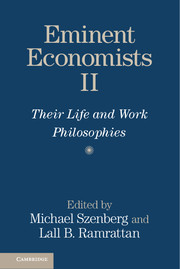Book contents
- Frontmatter
- Dedication
- Contents
- List of Contributors
- Foreword
- Preface and Acknowledgments
- Introduction
- 1 Being There: An Intellectual Journey
- 2 Social Norms in Economics and in the Economics Profession
- 3 Personal Reflections on My Professional Life
- 4 Gray Eminence?
- 5 Biochemist to Economist
- 6 Puzzles and Paradoxes: A Life in Applied Economics
- 7 Succeeding in Economics
- 8 My Research Strategy
- 9 My Philosophy of Economics, Life, and Everything (Not!)
- 10 Finding a Niche
- 11 Become an Economist – See the World
- 12 Practitioner of the Dismal Science? Who, Me? Couldn’t Be!!
- 13 One Job, Four Careers
- 14 My Life and Research Strategy
- 15 How I Ended Up Being a Multifaceted Economist and the Mentors I Have Had
- 16 Searching for My Personal Philosophy
- 17 Learning about the Evolving International Economy
- 18 Confessions of a Wellesley FEM
- 19 God, Ants, and Thomas Bayes
- 20 The Path of a Monetary Economist
- 21 Learning from the Field
- 22 Order in and through Disorder: The Invisible Hand as a Turbulent Regulator
- 23 The Education of an Economist
- 24 Faith, Science, and Religion
- 25 My Studies in International Economics
- 26 Sailing into the Wind
- 27 My Life and Work Philosophy
- 28 Scaling Fortress Economics
- 29 The Accidental Economist
- Index
- References
2 - Social Norms in Economics and in the Economics Profession
Published online by Cambridge University Press: 05 June 2014
- Frontmatter
- Dedication
- Contents
- List of Contributors
- Foreword
- Preface and Acknowledgments
- Introduction
- 1 Being There: An Intellectual Journey
- 2 Social Norms in Economics and in the Economics Profession
- 3 Personal Reflections on My Professional Life
- 4 Gray Eminence?
- 5 Biochemist to Economist
- 6 Puzzles and Paradoxes: A Life in Applied Economics
- 7 Succeeding in Economics
- 8 My Research Strategy
- 9 My Philosophy of Economics, Life, and Everything (Not!)
- 10 Finding a Niche
- 11 Become an Economist – See the World
- 12 Practitioner of the Dismal Science? Who, Me? Couldn’t Be!!
- 13 One Job, Four Careers
- 14 My Life and Research Strategy
- 15 How I Ended Up Being a Multifaceted Economist and the Mentors I Have Had
- 16 Searching for My Personal Philosophy
- 17 Learning about the Evolving International Economy
- 18 Confessions of a Wellesley FEM
- 19 God, Ants, and Thomas Bayes
- 20 The Path of a Monetary Economist
- 21 Learning from the Field
- 22 Order in and through Disorder: The Invisible Hand as a Turbulent Regulator
- 23 The Education of an Economist
- 24 Faith, Science, and Religion
- 25 My Studies in International Economics
- 26 Sailing into the Wind
- 27 My Life and Work Philosophy
- 28 Scaling Fortress Economics
- 29 The Accidental Economist
- Index
- References
Summary
My Formative Years
I probably became an economist when I was five years old, walking my beloved maid Nazarene to catch her bus.
Skipping along, I said, “I want to be Alice in Wonderland. It’s a great movie. You’ve got to see it.”
Nazarene replied, “Clair, I can’t go see it.”
Puzzled, I asked, “Why not?”
“’’Cause it’s playing at the whites’ theater. They don’t allow coloreds in.”
Confused, I started noticing many other things that didn’t make sense – Nazarene’s worn-out sandals, her walking to the back of the bus after she got on, her drinking out of a dif erent water fountain at the grocery store.
Nazarene gave me a good start in life with her loving care, her patience, and her wisdom. She also unknowingly taught me how the world set up rules that were grossly unfair, and yet people followed them as if they were fair and reasonable. Nazarene prepared me to question discrimination against women as well as people of color, and taught me through example not to take injury incurred through discrimination personally. Years later these childhood lessons gave me the courage to go into a profession that was not welcoming to women.
- Type
- Chapter
- Information
- Eminent Economists IITheir Life and Work Philosophies, pp. 30 - 44Publisher: Cambridge University PressPrint publication year: 2014



